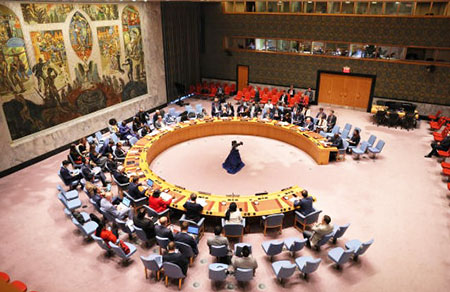Special to WorldTribune.com
 By John J. Metzler, June 17, 2023
By John J. Metzler, June 17, 2023
In one of the more predictable rites of Spring at the United Nations, the General Assembly has elected, or actually selected, five new non-permanent members to serve on the powerful fifteen member Security Council.
While this year’s contest lacked the drama, debate and deliberation of the past, nonetheless, there were some positive outcomes to the current vote.
The Council’s five Permanent members are among the UN’s founders in 1945 and the Big Five during WWII; China, France, Russia, the United Kingdom and the United States.
Indeed, the so-called Perm 5 with veto power still hold the cards. Yet there are another ten non-permanent members elected for two-year terms from among the UN’s 193 member states.

So, in the current contest members from the different geographical groups are chosen for a coveted two-year tenure in the UN’s most powerful deliberative body. Voting for the new non-permanent members is carried out in the General Assembly by secret ballot and even an unopposed state must receive two/thirds majority, that’s 128 votes.
But non-contested “done deal” selections are not really elections but back-room arrangements to show consensus and at the same time stifle debate and genuine competition for what amounts to an important vote/voice on the Council. Such cozy accord may be fleetingly attractive but in the long run debases the vote and value of these non-permanent seats.
Now let’s take a look at the new members.
Africa
Algeria and Sierra Leone were selected in a non-contested election for the seats. Both members will replace Gabon and Ghana. The People’s Democratic Republic of Algeria, since its independence from France in 1962, has been a traditionally “progressive” socialist North African regime. Freedom House, the human rights watchdog, ranks the country as “Not Free” while its ratings on civil and political rights for Algeria stand at only 32 out of 100.
Sierra Leone, a West African state, ranks as “Partly Free” with a score of 63 out of 100. The African selection saw the traditional linguistic balance of choosing a French and English speaking country.
Asia/Pacific
The Republic of Korea, aka South Korea, won the Asian seat uncontested. The South Korean government ranks highly with Freedom House rated as a “Free” country with an impressive score of 83 out of 100! For comparison, communist North Korea ranks as 3 out of 100!
South Korea’s seat replaces the United Arab Emirates.
Since joining the UN in 1991, South Korea has played a strong role in UN security and development issues; ROK served on the Security Council on two prior occasions. The Seoul government has the diplomatic depth and gravitas to play a positive role in the next two years.
|
Slovenia is ranked by Freedom House 95 out of 100! That’s higher than the USA at 83 by the way. Belarus is ranked 8 out of 100! |
Interestingly South Korea will serve alongside Japan in the Council during 2024.
Eastern Europe
Here’s where the political action was. Belarus was vying for a seat against Slovenia, the small Alpine democracy which was once part of Yugoslavia. Belarus, a buffo comrade of Putin’s Russia was running for the seat since 2007. But Moscow’s invasion of Ukraine put a negative spotlight on authoritarian Belarus and by December 2021 a competing candidate emerged. The European Union and the U.S. pushed to get another candidate to challenge the seat. Slovenia won with 153 votes to 38 for Belarus.
Slovenia is ranked by Freedom House 95 out of 100! That’s higher than the USA at 83 by the way. Belarus is ranked 8 out of 100! Even Russia scores 16 out of 100. Needless to say Belarus has an image problem even in the hallowed halls of the UN. It’s current plan to host Russian tactics nuclear weapons sealed its fate. Slovenia will gain the seat now held by Albania.
Latin America/Caribbean
For the Latin America group, Guyana was selected unopposed. Guyana remains a good choice as the country has a 73 out of 100 Freedom House rating. English speaking Guyana bordering Venezuela has faced some of the refugee outflow from the socialist state. Guyana takes the seat held by Brazil.
During these turbulent times there’s increasing focus on the Security Council whose responsibility to maintain international peace and security has been globally stressed and overextended. During the past decade the Council faced a Cold War style political logjam between West and East.
This new Council balance slightly favors U.S. interests as South Korea and Slovenia are firm allies. The new members take their places in January 2024.
Reviving a Security Council which works beyond ideological lines while unlikely today, clearly remains a long-term necessity.
John J. Metzler is a United Nations correspondent covering diplomatic and defense issues. He is the author of Divided Dynamism the Diplomacy of Separated Nations: Germany, Korea, China (2014). [See pre-2011 Archives]
